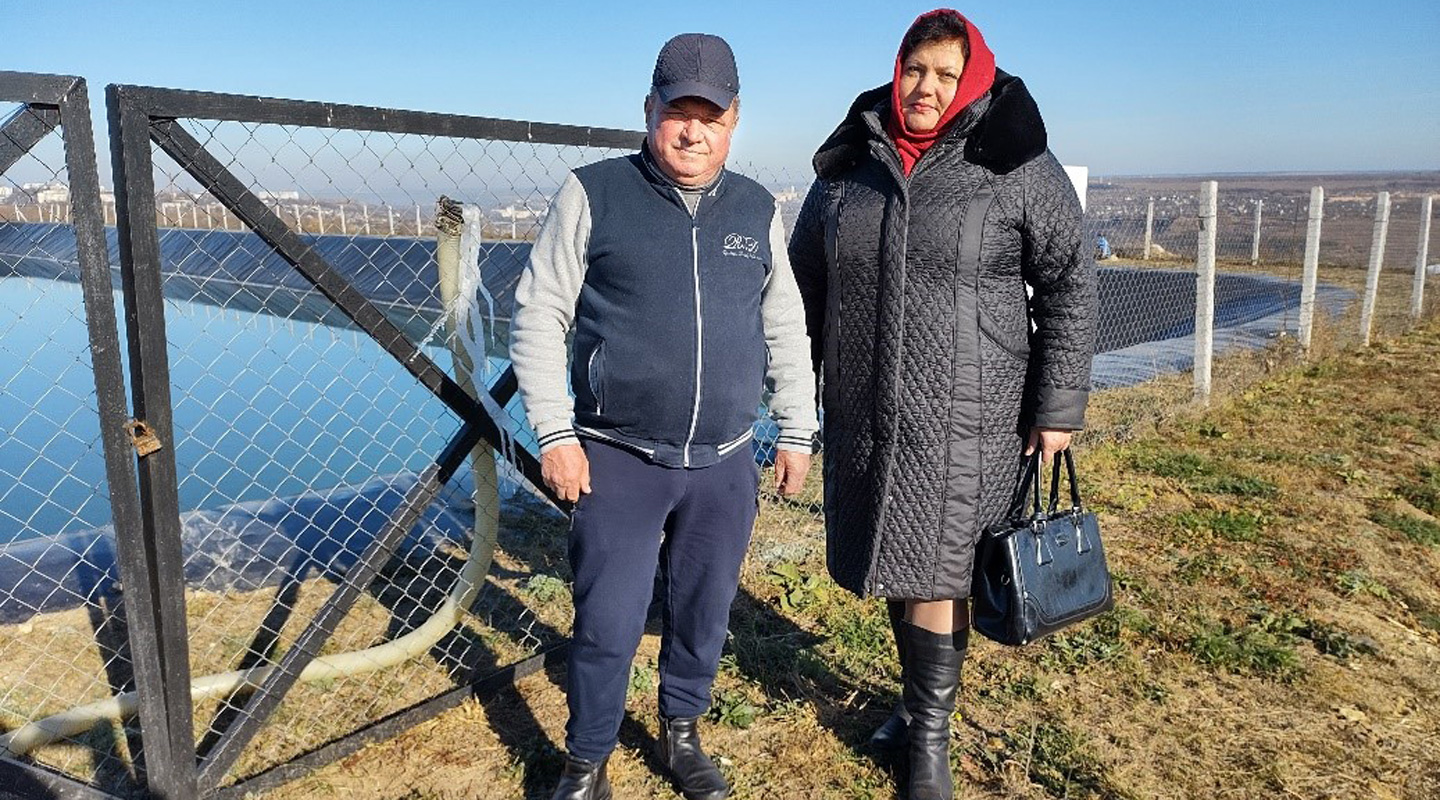What is life like for farmers on Moldova’s border with Ukraine?
IFAD Asset Request Portlet
Asset Publisher
What is life like for farmers on Moldova’s border with Ukraine?
Estimated reading time: 3 minutes
Ceban Serghei, manager of a local cooperative, and Maria Macril, the former mayor of Saharna Nouà, stand beside the water reservoir built with funds from IFAD's Rural Resilience Programme.
The small village of Saharna Nouà sits on the bank of the Dniester River in eastern Moldova. On the other side of the river is the Transnistrian region and, beyond that, the border with Ukraine.
IFAD’s Rural Resilience Programme has been working with small-scale farmers in Saharna Nouà since 2017. The village had been struggling with recurrent droughts – an especially difficult problem given that walnuts, a highly water-intensive crop, are one of the mainstays of the region. The programme developed an irrigation system that pumps water from the Dniester to a reservoir uphill, which local farmers can draw from as needed.
When we last spoke with Ion Mihailà, a local economist who’s also a walnut farmer, he was enthusiastic about the new system. “We expect a productivity gain of 30 per cent,” he’d told us. “We also expect the nuts will be bigger and more homogenous, which will make finding buyers easier.”
But while the programme may have helped the farmers of Saharna Nouà become more resilient to climate change, their resilience to disruptions in supply chains and markets is about to be put to the test due to the spill over effects from the war in Ukraine.
Moldova is already experiencing the impacts of the war in its neighbouring country. Since the start of the war, Moldovans have opened their borders, homes, and hearts to more than 460,000 refugees (as of 18 May 2022). The country hosts the largest per capita number of Ukrainian refugees in the world. UN Secretary-General Antonio Guterres has praised Moldova’s outstanding example of humanity and solidarity.
Before the war, there had been plans to expand and improve the irrigation system. Each member of the local Water Users’ Association had hoped to install their own system connecting them to the reservoir, and there was talk of constructing a new road that would grant easier access to the hilltop.
But now, Ion says, the price of equipment has increased by 15 per cent and delivery times have doubled from two to four months, while the port of destination has changed from nearby Odesa in Ukraine to Constanta in Romania—a four-hour drive away. As for the new road, the increased costs would likely outweigh the benefits.
The Water Users’ Association had also created jobs. Each farmer employed one or two people, with an additional two people responsible for the association’s accounting and administration. Before the war, the association expected to hire even more, but now these employment opportunities are in jeopardy.
The first harvests under the new system are still expected in autumn 2022. But for now, as the walnuts ripen on their branches, the village’s farmers can only wait and see how the situation progresses.
Although they had planned to obtain organic certifications and join forces with other local companies to export to European countries, the farmers will now sell their expected 3 to 5 tonnes of produce locally. Despite the dropping demand from Ukraine and Russia, the influx of Ukrainian refugees into Moldova may create a larger domestic market.
IFAD is providing strategic support to Moldova in these unprecedented times. Working closely with the country’s Ministry of Agriculture and Food Industry and other UN agencies, IFAD is assessing the situation to find optimal ways of building rural resilience and supporting farmers with financial initiatives, especially for the upcoming autumn production cycle. We’re intensifying our efforts to increase local food production, reduce post-harvest losses, and strengthen local and regional markets.
As the people of Saharna Nouà adjust to their new reality, IFAD continues to support small-scale farmers, improve their resilience to climate change, and promote investments in productive rural infrastructure and agri-systems. Among other benefits, we hope this will help young entrepreneurs remain in rural areas and lead a new generation of young farmers investing in Moldova’s future.
Keep up-to-date with IFAD’s latest developments on Ukraine.
Read about our Crisis Response Initiative, established in response to the war to protect livelihoods and build resilience in rural communities.
Explore all IFAD’s work in Moldova.
Publication date: 30 May 2022